University Finance: Literature Review on Finance Service Regulations
VerifiedAdded on 2022/09/15
|7
|1309
|20
Literature Review
AI Summary
This literature review examines the significance of independent directors in finance service regulations. It begins with an introduction and background on the topic, emphasizing the importance of director independence for unbiased decision-making and transparency. The review presents arguments supporting the positive impact of independent directors, citing their experience, impartiality, and role in preventing corporate scandals. It also explores arguments against the notion, highlighting potential drawbacks such as a lack of financial interest and possible limitations in decision-making efficiency. The review includes practical examples, referencing companies in China and Bangladesh, and concludes that the arguments in favor of director independence outweigh the arguments against it, making it a crucial factor for business success. The review adheres to the provided guidelines, incorporating academic literature, practical implications, and a balanced discussion of supporting and critical arguments.
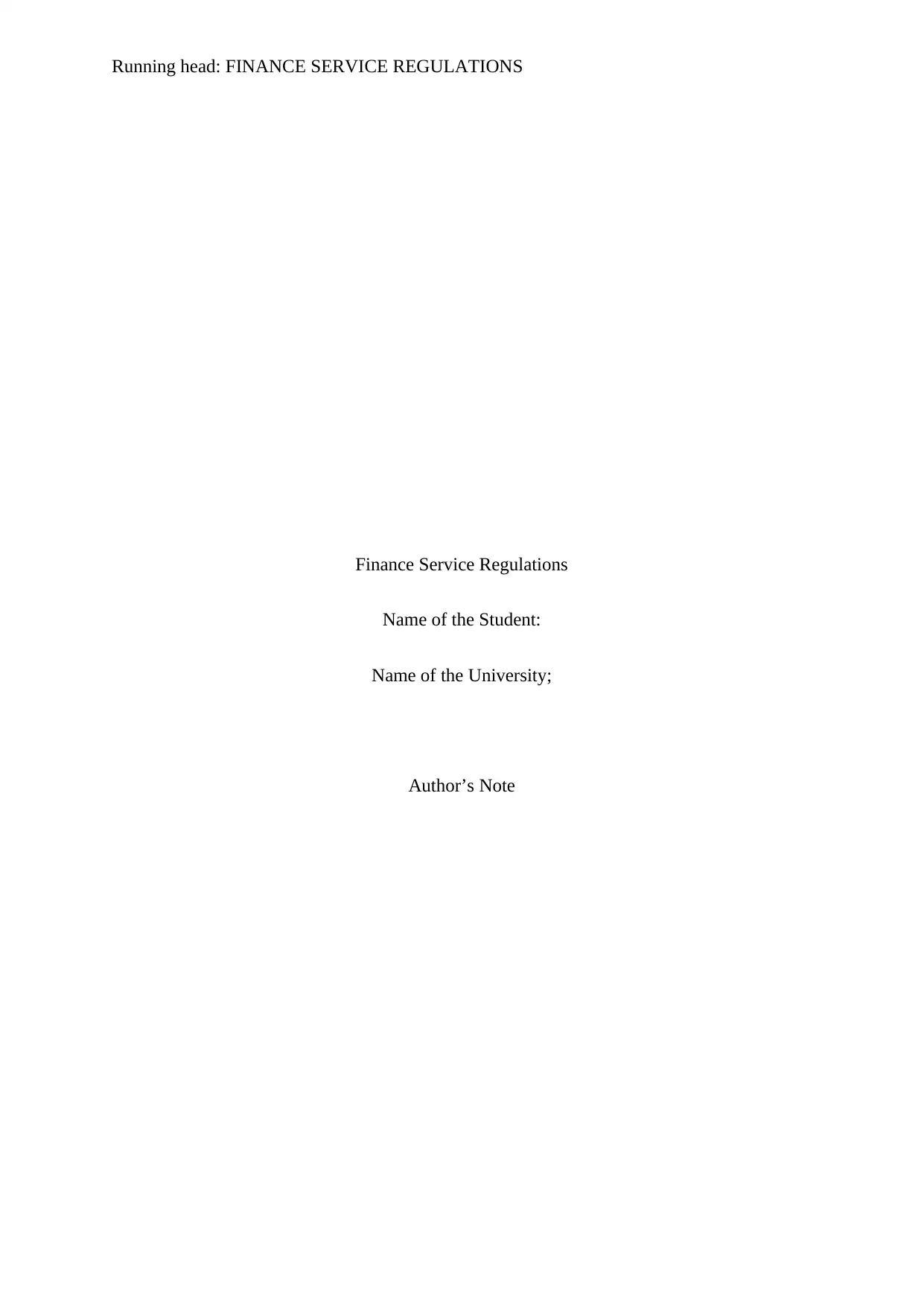
Running head: FINANCE SERVICE REGULATIONS
Finance Service Regulations
Name of the Student:
Name of the University;
Author’s Note
Finance Service Regulations
Name of the Student:
Name of the University;
Author’s Note
Paraphrase This Document
Need a fresh take? Get an instant paraphrase of this document with our AI Paraphraser

1
FINANCE SERVICE REGULATIONS
Table of Contents
Introduction....................................................................................................................2
Background....................................................................................................................2
Arguments in Support....................................................................................................3
Arguments against the Notion........................................................................................4
Practical Examples.........................................................................................................4
Conclusion......................................................................................................................5
Reference........................................................................................................................6
FINANCE SERVICE REGULATIONS
Table of Contents
Introduction....................................................................................................................2
Background....................................................................................................................2
Arguments in Support....................................................................................................3
Arguments against the Notion........................................................................................4
Practical Examples.........................................................................................................4
Conclusion......................................................................................................................5
Reference........................................................................................................................6
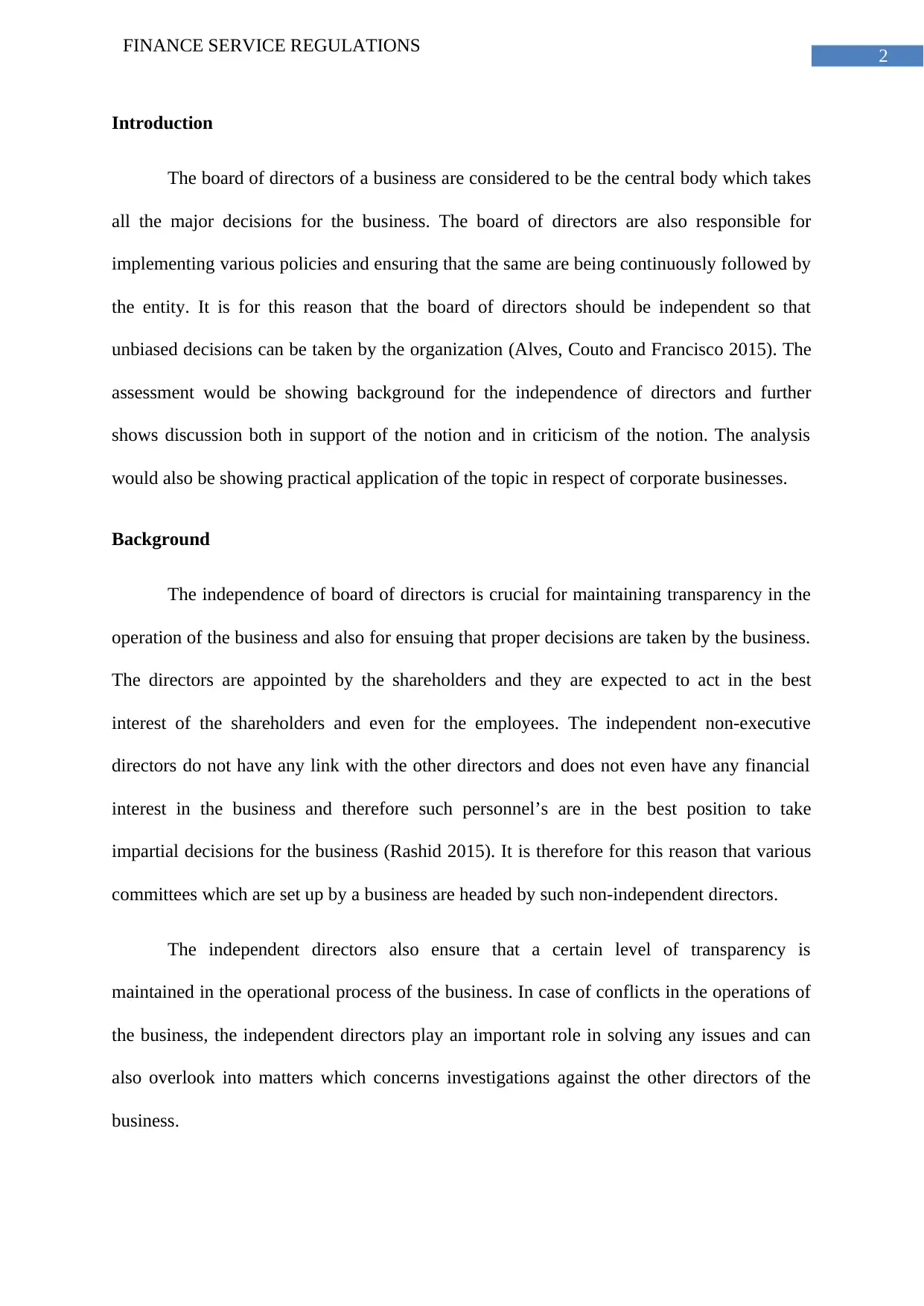
2
FINANCE SERVICE REGULATIONS
Introduction
The board of directors of a business are considered to be the central body which takes
all the major decisions for the business. The board of directors are also responsible for
implementing various policies and ensuring that the same are being continuously followed by
the entity. It is for this reason that the board of directors should be independent so that
unbiased decisions can be taken by the organization (Alves, Couto and Francisco 2015). The
assessment would be showing background for the independence of directors and further
shows discussion both in support of the notion and in criticism of the notion. The analysis
would also be showing practical application of the topic in respect of corporate businesses.
Background
The independence of board of directors is crucial for maintaining transparency in the
operation of the business and also for ensuing that proper decisions are taken by the business.
The directors are appointed by the shareholders and they are expected to act in the best
interest of the shareholders and even for the employees. The independent non-executive
directors do not have any link with the other directors and does not even have any financial
interest in the business and therefore such personnel’s are in the best position to take
impartial decisions for the business (Rashid 2015). It is therefore for this reason that various
committees which are set up by a business are headed by such non-independent directors.
The independent directors also ensure that a certain level of transparency is
maintained in the operational process of the business. In case of conflicts in the operations of
the business, the independent directors play an important role in solving any issues and can
also overlook into matters which concerns investigations against the other directors of the
business.
FINANCE SERVICE REGULATIONS
Introduction
The board of directors of a business are considered to be the central body which takes
all the major decisions for the business. The board of directors are also responsible for
implementing various policies and ensuring that the same are being continuously followed by
the entity. It is for this reason that the board of directors should be independent so that
unbiased decisions can be taken by the organization (Alves, Couto and Francisco 2015). The
assessment would be showing background for the independence of directors and further
shows discussion both in support of the notion and in criticism of the notion. The analysis
would also be showing practical application of the topic in respect of corporate businesses.
Background
The independence of board of directors is crucial for maintaining transparency in the
operation of the business and also for ensuing that proper decisions are taken by the business.
The directors are appointed by the shareholders and they are expected to act in the best
interest of the shareholders and even for the employees. The independent non-executive
directors do not have any link with the other directors and does not even have any financial
interest in the business and therefore such personnel’s are in the best position to take
impartial decisions for the business (Rashid 2015). It is therefore for this reason that various
committees which are set up by a business are headed by such non-independent directors.
The independent directors also ensure that a certain level of transparency is
maintained in the operational process of the business. In case of conflicts in the operations of
the business, the independent directors play an important role in solving any issues and can
also overlook into matters which concerns investigations against the other directors of the
business.
⊘ This is a preview!⊘
Do you want full access?
Subscribe today to unlock all pages.

Trusted by 1+ million students worldwide
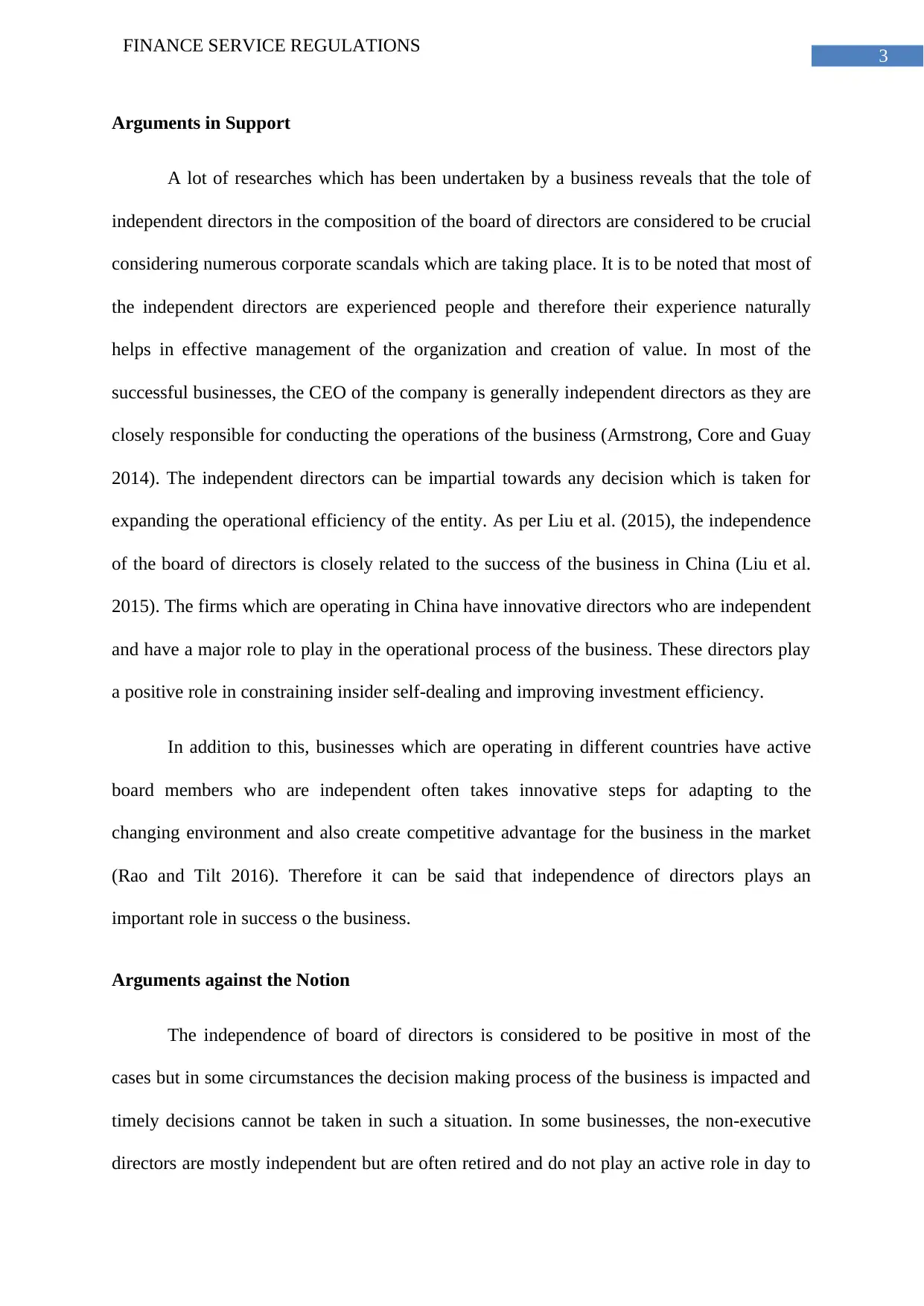
3
FINANCE SERVICE REGULATIONS
Arguments in Support
A lot of researches which has been undertaken by a business reveals that the tole of
independent directors in the composition of the board of directors are considered to be crucial
considering numerous corporate scandals which are taking place. It is to be noted that most of
the independent directors are experienced people and therefore their experience naturally
helps in effective management of the organization and creation of value. In most of the
successful businesses, the CEO of the company is generally independent directors as they are
closely responsible for conducting the operations of the business (Armstrong, Core and Guay
2014). The independent directors can be impartial towards any decision which is taken for
expanding the operational efficiency of the entity. As per Liu et al. (2015), the independence
of the board of directors is closely related to the success of the business in China (Liu et al.
2015). The firms which are operating in China have innovative directors who are independent
and have a major role to play in the operational process of the business. These directors play
a positive role in constraining insider self-dealing and improving investment efficiency.
In addition to this, businesses which are operating in different countries have active
board members who are independent often takes innovative steps for adapting to the
changing environment and also create competitive advantage for the business in the market
(Rao and Tilt 2016). Therefore it can be said that independence of directors plays an
important role in success o the business.
Arguments against the Notion
The independence of board of directors is considered to be positive in most of the
cases but in some circumstances the decision making process of the business is impacted and
timely decisions cannot be taken in such a situation. In some businesses, the non-executive
directors are mostly independent but are often retired and do not play an active role in day to
FINANCE SERVICE REGULATIONS
Arguments in Support
A lot of researches which has been undertaken by a business reveals that the tole of
independent directors in the composition of the board of directors are considered to be crucial
considering numerous corporate scandals which are taking place. It is to be noted that most of
the independent directors are experienced people and therefore their experience naturally
helps in effective management of the organization and creation of value. In most of the
successful businesses, the CEO of the company is generally independent directors as they are
closely responsible for conducting the operations of the business (Armstrong, Core and Guay
2014). The independent directors can be impartial towards any decision which is taken for
expanding the operational efficiency of the entity. As per Liu et al. (2015), the independence
of the board of directors is closely related to the success of the business in China (Liu et al.
2015). The firms which are operating in China have innovative directors who are independent
and have a major role to play in the operational process of the business. These directors play
a positive role in constraining insider self-dealing and improving investment efficiency.
In addition to this, businesses which are operating in different countries have active
board members who are independent often takes innovative steps for adapting to the
changing environment and also create competitive advantage for the business in the market
(Rao and Tilt 2016). Therefore it can be said that independence of directors plays an
important role in success o the business.
Arguments against the Notion
The independence of board of directors is considered to be positive in most of the
cases but in some circumstances the decision making process of the business is impacted and
timely decisions cannot be taken in such a situation. In some businesses, the non-executive
directors are mostly independent but are often retired and do not play an active role in day to
Paraphrase This Document
Need a fresh take? Get an instant paraphrase of this document with our AI Paraphraser
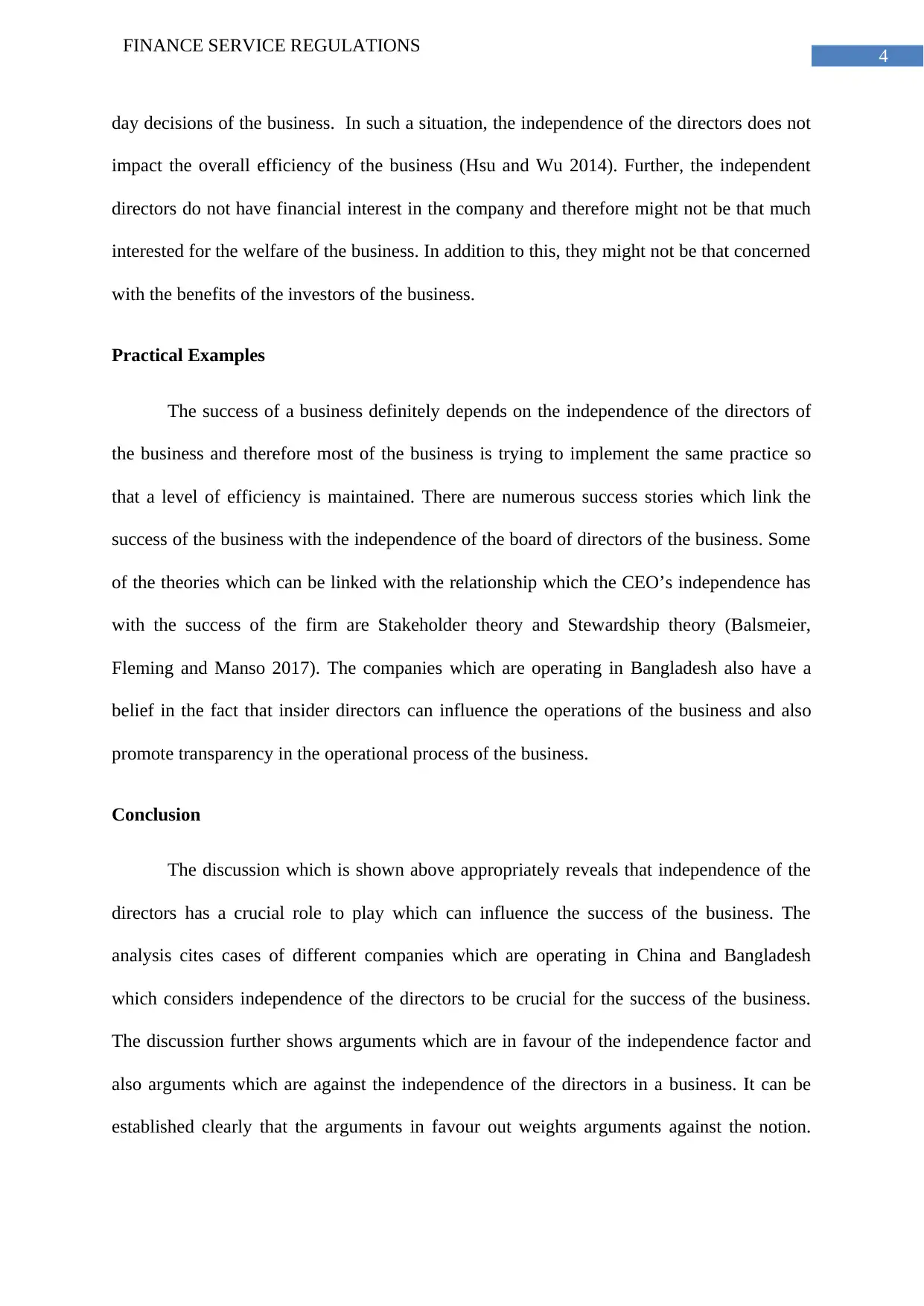
4
FINANCE SERVICE REGULATIONS
day decisions of the business. In such a situation, the independence of the directors does not
impact the overall efficiency of the business (Hsu and Wu 2014). Further, the independent
directors do not have financial interest in the company and therefore might not be that much
interested for the welfare of the business. In addition to this, they might not be that concerned
with the benefits of the investors of the business.
Practical Examples
The success of a business definitely depends on the independence of the directors of
the business and therefore most of the business is trying to implement the same practice so
that a level of efficiency is maintained. There are numerous success stories which link the
success of the business with the independence of the board of directors of the business. Some
of the theories which can be linked with the relationship which the CEO’s independence has
with the success of the firm are Stakeholder theory and Stewardship theory (Balsmeier,
Fleming and Manso 2017). The companies which are operating in Bangladesh also have a
belief in the fact that insider directors can influence the operations of the business and also
promote transparency in the operational process of the business.
Conclusion
The discussion which is shown above appropriately reveals that independence of the
directors has a crucial role to play which can influence the success of the business. The
analysis cites cases of different companies which are operating in China and Bangladesh
which considers independence of the directors to be crucial for the success of the business.
The discussion further shows arguments which are in favour of the independence factor and
also arguments which are against the independence of the directors in a business. It can be
established clearly that the arguments in favour out weights arguments against the notion.
FINANCE SERVICE REGULATIONS
day decisions of the business. In such a situation, the independence of the directors does not
impact the overall efficiency of the business (Hsu and Wu 2014). Further, the independent
directors do not have financial interest in the company and therefore might not be that much
interested for the welfare of the business. In addition to this, they might not be that concerned
with the benefits of the investors of the business.
Practical Examples
The success of a business definitely depends on the independence of the directors of
the business and therefore most of the business is trying to implement the same practice so
that a level of efficiency is maintained. There are numerous success stories which link the
success of the business with the independence of the board of directors of the business. Some
of the theories which can be linked with the relationship which the CEO’s independence has
with the success of the firm are Stakeholder theory and Stewardship theory (Balsmeier,
Fleming and Manso 2017). The companies which are operating in Bangladesh also have a
belief in the fact that insider directors can influence the operations of the business and also
promote transparency in the operational process of the business.
Conclusion
The discussion which is shown above appropriately reveals that independence of the
directors has a crucial role to play which can influence the success of the business. The
analysis cites cases of different companies which are operating in China and Bangladesh
which considers independence of the directors to be crucial for the success of the business.
The discussion further shows arguments which are in favour of the independence factor and
also arguments which are against the independence of the directors in a business. It can be
established clearly that the arguments in favour out weights arguments against the notion.

5
FINANCE SERVICE REGULATIONS
Therefore, it can be said that independence of the directors is a crucial factor which can
positively impact the operations of the business.
FINANCE SERVICE REGULATIONS
Therefore, it can be said that independence of the directors is a crucial factor which can
positively impact the operations of the business.
⊘ This is a preview!⊘
Do you want full access?
Subscribe today to unlock all pages.

Trusted by 1+ million students worldwide
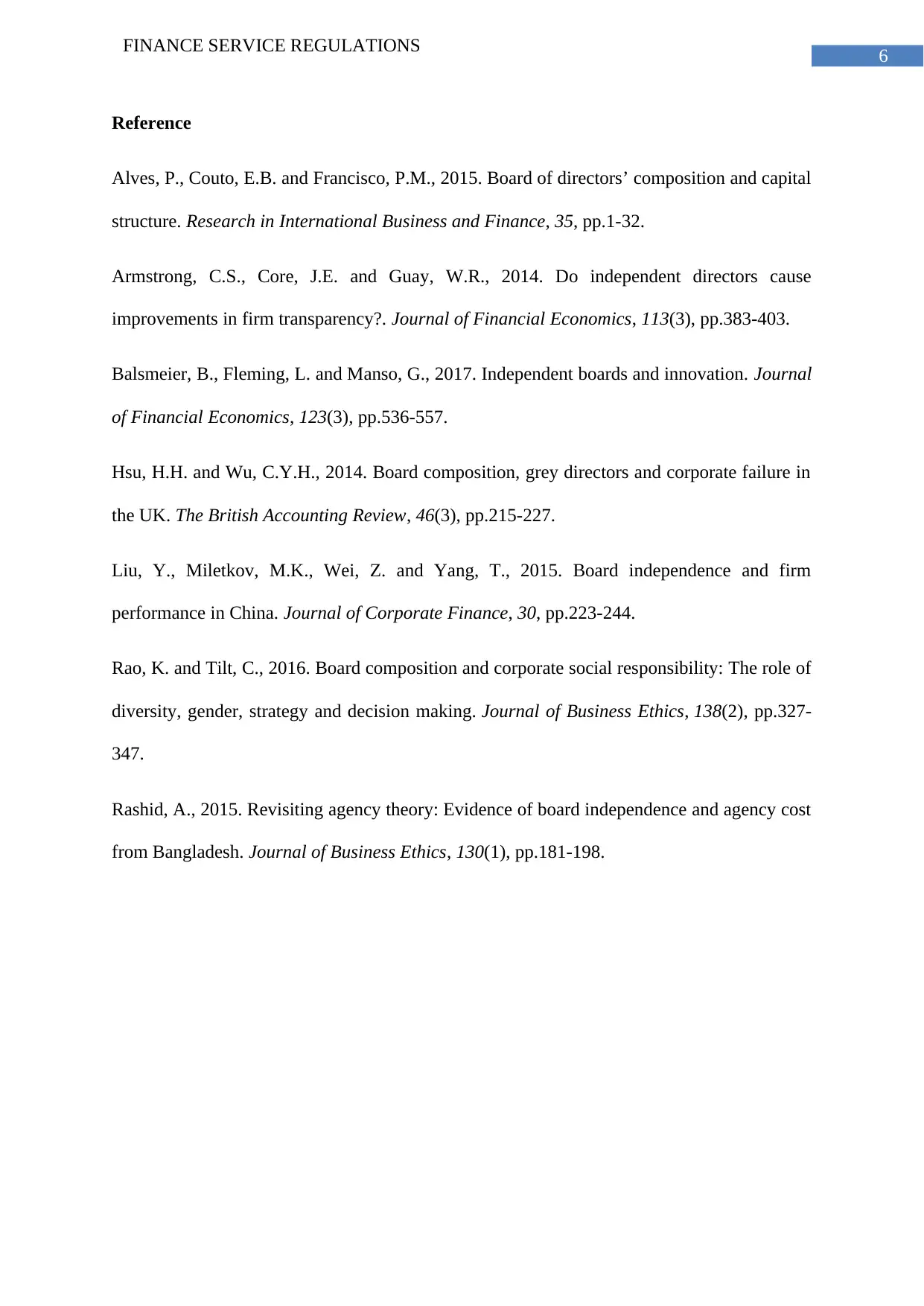
6
FINANCE SERVICE REGULATIONS
Reference
Alves, P., Couto, E.B. and Francisco, P.M., 2015. Board of directors’ composition and capital
structure. Research in International Business and Finance, 35, pp.1-32.
Armstrong, C.S., Core, J.E. and Guay, W.R., 2014. Do independent directors cause
improvements in firm transparency?. Journal of Financial Economics, 113(3), pp.383-403.
Balsmeier, B., Fleming, L. and Manso, G., 2017. Independent boards and innovation. Journal
of Financial Economics, 123(3), pp.536-557.
Hsu, H.H. and Wu, C.Y.H., 2014. Board composition, grey directors and corporate failure in
the UK. The British Accounting Review, 46(3), pp.215-227.
Liu, Y., Miletkov, M.K., Wei, Z. and Yang, T., 2015. Board independence and firm
performance in China. Journal of Corporate Finance, 30, pp.223-244.
Rao, K. and Tilt, C., 2016. Board composition and corporate social responsibility: The role of
diversity, gender, strategy and decision making. Journal of Business Ethics, 138(2), pp.327-
347.
Rashid, A., 2015. Revisiting agency theory: Evidence of board independence and agency cost
from Bangladesh. Journal of Business Ethics, 130(1), pp.181-198.
FINANCE SERVICE REGULATIONS
Reference
Alves, P., Couto, E.B. and Francisco, P.M., 2015. Board of directors’ composition and capital
structure. Research in International Business and Finance, 35, pp.1-32.
Armstrong, C.S., Core, J.E. and Guay, W.R., 2014. Do independent directors cause
improvements in firm transparency?. Journal of Financial Economics, 113(3), pp.383-403.
Balsmeier, B., Fleming, L. and Manso, G., 2017. Independent boards and innovation. Journal
of Financial Economics, 123(3), pp.536-557.
Hsu, H.H. and Wu, C.Y.H., 2014. Board composition, grey directors and corporate failure in
the UK. The British Accounting Review, 46(3), pp.215-227.
Liu, Y., Miletkov, M.K., Wei, Z. and Yang, T., 2015. Board independence and firm
performance in China. Journal of Corporate Finance, 30, pp.223-244.
Rao, K. and Tilt, C., 2016. Board composition and corporate social responsibility: The role of
diversity, gender, strategy and decision making. Journal of Business Ethics, 138(2), pp.327-
347.
Rashid, A., 2015. Revisiting agency theory: Evidence of board independence and agency cost
from Bangladesh. Journal of Business Ethics, 130(1), pp.181-198.
1 out of 7
Related Documents
Your All-in-One AI-Powered Toolkit for Academic Success.
+13062052269
info@desklib.com
Available 24*7 on WhatsApp / Email
![[object Object]](/_next/static/media/star-bottom.7253800d.svg)
Unlock your academic potential
Copyright © 2020–2026 A2Z Services. All Rights Reserved. Developed and managed by ZUCOL.





